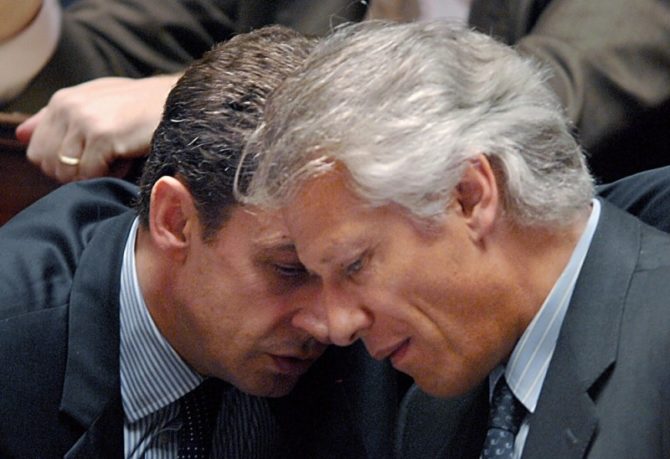Muddy Waters

France’s long national nightmare is not over. Gerald Ford’s simple declaration about an American nightmare, after pardoning Richard Nixon in 1978, comes to mind as the relentless duel between Nicolas Sarkozy and Dominique de Villepin heads toward another turn in the courts.
But Clearstream is no national nightmare. The word may be as fraught as verbal shorthand possibly could be, but at this stage the affair qualifies as no more than a king-of-the-mountain match. It’s too complicated to make it as a soap opera.
Politics makes bitter enemies more often than strange bedfellows, and the relationship between France’s president and its former prime minister is bitter indeed. A single party identification—both are members of the party in power, the Union for a Popular Majority (UMP)—gives them no common ground. One is president, and the other thinks it’s a grave error that he himself isn’t. There’s nothing in those divergent thoughts that would unite them.
Villepin, 56, former Prime Minister, is a crafty politician whose silvered mane and princely elegance disguise some colossal errors of political judgment. Drawn from relative obscurity in the diplomatic corps to become President Jacques Chirac’s chief of staff, he was a leading architect of the 1997 decision to dissolve the heavily rightist parliament and call for early elections. The intent was to obtain a closer balance between left and right, but with Chirac’s party still in power. The result was a closer balance all right, but with the Socialists on top. The rest of Chirac’s first term was marked by “cohabitation” with the Socialists. Chirac called it paralysis, his wife called Villepin “Nero”.
Besides his aspirations as a Machiavellian prince, Villepin is a poet, a historian and a philosopher. Physically, he appears the idealized Frenchman. Tall and aristocratic, he starred as the eloquent voice of France at the UN in 2003, explaining why the US was wrong and France was right about intervening in Iraq. Villepin rightly can (and does) smile wisely when complimented on his wisdom about the Bush adventure.
The fact that Villepin is a diplomat who has never been elected to office, however, is cited as one explanation for the judgmental error that helped Chirac accommodate himself to paralysis.
Clearstream ahead
Sarkozy—consummately political—has not been free of bad political judgment. Most notably he backed Edouard Balladur over Chirac for the presidency in 2002, gaining credentials as strictly self-interested.
Sarkozy recovered, obviously. Although he had been disloyal to Chirac, his popularity with voters forced Chirac to embrace him and bring him back into the government. Short and flashy (President Bling-Bling), he speaks plainly and with frequent vulgarity, and he possesses an untroubled instinct for any opponent’s jugular. Villepin calls him “the dwarf”. Sarkozy diagnoses Villepin as schizophrenic.
The details of their history explain their antipathy, but any explanation would detract from the central fact of that consuming hatred. For the moment, the catchword Clearstream harbors a welter of details. As metonymy, the word will never achieve the cultural and linguistic stature of Watergate. But then Clearstream has the advantage of never being characterized as a third-rate burglary. As with Watergate, though, an enemies list appears to have figured in the inception of the convoluted scandal. The list—of French citizens holding secret bank accounts with Clearstream—would have been encouraged by Chirac and exploited by Villepin. At least, that would be the basis for Sarkozy’s subsequent efforts to bury Villepin.
Clearstream itself is a major international financial institution based in Luxembourg. Its essential role in today’s borderless finance is to track payments between banks and calculate their relative positions. In the simplest example, Clearstream’s function means that a transfer of dollars from Merrill Lynch to Barclays is a virtual deal that doesn’t require delivering a stack of cash. Clearstream records the transaction and debits Merrill and credits Barclays. Et voilà! The money moves. But Clearstream is also a bank, and it’s based in one of the convenient spots on the Continent where Europeans go to visit their untaxed assets. In other words, there may be some secret accounts on Clearstream’s books.
While Sarkozy was revving up his campaign for the French presidency, he and other prominent Frenchmen became the target of anonymous reports that they had secret accounts at Clearstream that served as conduits for kickbacks. At the time, the most significant source of those illegal deposits would have been the corrupt deal during the Mitterrand years that delivered frigates to Taiwan and “commissions” to the French officials who facilitated the sale, or knew the dirty secret.
It’s not the efficient back office duties at Clearstream that have made it famous. The bank and the institutions that merged to create it have been accused over the years in a plethora of financial scandals—Banco Ambrosiano, diverted IMF funds, kickback schemes that have brought down governments and sent officials reeling in humiliation. It did not require a creative genius to link Clearstream to the basest of allegations against a high-profile official and have a degree of instant credibility.
Long day in court
When Sarkozy became president he obtained access to everything about France’s dark side. He could learn, for example, that while serving as Foreign Minister Dominique de Villepin had passed along computer printouts—whose authenticity was later questioned—listing secret Clearstream accounts and their owners. Sarkozy supposedly figured in the list, although in code.
He could also learn that the case—whose pursuit had dithered if not dissolved—got moved ahead again when Villepin jumped from the Foreign Ministry to Interior (succeeding, in fact, Sarkozy, who moved to Finance). The Interior Ministry includes the Directorate of Territorial Security, France’s counterespionage agency, and with that under his command one could assume that Villepin’s interests would be attentively served.
In that period, Villepin was quoted as telling then Prime Minister Jean-Pierre Raffarin that if journalists “did their jobs,” Sarkozy was “finished”. Such details fed the circumstantial case against Villepin—or, if you prefer, helped stack the deck against him—when Sarkozy decided to go to court, accusing Villepin of masterminding a smear campaign.
After months of preparation, with occasional revisions in the charges and defendants, the court heard five weeks of testimony with Villepin sitting in the dock, in the same courtroom where Marie Antoinette was sentenced to the guillotine in 1793. The tribunal ruled that the charges against him—including complicity to slander, use of forgeries and breach of trust—were “not proven”.
That was slightly less than an acquittal, but it was enough to deal Sarkozy a huge embarrassment. What it handed Villepin was a lot of encouragement for his presidential ambitions. He told an interviewer that, in winning against Sarkozy’s implacable pursuit, he will finally reverse Sarkozy’s fortunes. And, it might be added, wind up as president himself.
The prosecutor has announced that he will appeal the tribunal’s ruling, but that his decision to do so is all about justice and has nothing to do with Sarkozy.
Not very many people believe that. Villepin’s notion is that Sarkozy’s hatred alone keeps the case alive. That opinion may be overstated, but it’s probably not wrong.
Anna Cabana of weekly newsmagazine Le Point reveals another of his perceptions. In her new book La Verticale du Fou—and explaining what the title means is nearly as complicated as explaining Clearstream—Cabana relates a conversation in which Villepin compares his role in government to that of the fearless head of a network of Resistance spies during the German occupation. That invites the question: Would that have been as prime minister? As foreign minister? Or was that part of Interior’s dark side?
Referring to the classic description of the medieval knight Bayard, sans peur et sans reproche, one detractor says of Dominique de Villepin: “Always without fear, always above reproach. Mais jamais sans brushing“—never without his blow-dry.
Originally published in the March 2010 issue of France Today
Share to: Facebook Twitter LinkedIn Email
Leave a reply
Your email address will not be published. Required fields are marked *



